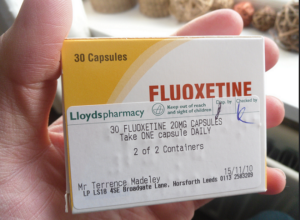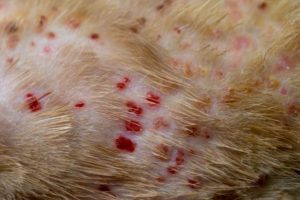Hyperesthesia in Cats

Rather then being a single disease, Feline Hyperesthesia Syndrome (FHS) is a set of symptoms that indicates the presence of a dermal, neurological or behavioral problem. The opposite of anesthesia, instead of a LACK of sensation, an affected cat has TOO MUCH sensation in her skin or in the muscles under her skin. Much like tickling, it begins pleasantly enough before devolving into something both painful and distressing.
The classic symptoms of FHS – lasting a few seconds or several minutes – are episodes of a cat’s skin twitching or rolling. She may not only appear uncomfortable, her pupils may be dilated or she may be staring off into space. Normally calm cats may become aggressive during an episode while aggressive cats may grow calmer. And episodes occur most often in the morning or evening — the dawn/dusk times when cats in the wild would be hunting.
appear uncomfortable, her pupils may be dilated or she may be staring off into space. Normally calm cats may become aggressive during an episode while aggressive cats may grow calmer. And episodes occur most often in the morning or evening — the dawn/dusk times when cats in the wild would be hunting.
Some cats with milder forms of FHS experience pain when they’re petted, particularly along their lower backs. Some may lick or bite themselves, often leading to shortened hair or baldness in those areas. Some will attack their tails or lower backs while others will lick or chew at their paws. Cats with more severe symptoms may cry or race screaming from room to room, mutilate their tails or suffer seizures if touched in a certain way.
 00000000000
00000000000
Possible causes or triggers of FHS include allergies to food (this requires a special diet) or pollen, fleas, mites and ringworm. The symptoms of milder skin allergies can be relieved by antihistamines like doxepin, while more troublesome cases are usually treated with prednisolone, a steroid that eliminates any and all offending parasites. Skin scrapings detect the presence of mites and a fungal culture will test for ringworm. Bravecto ointment, applied to your cat’s skin, is designed to kill both fleas and mites.
If treating your cat for skin issues doesn’t help, a neurological problem — affecting her spinal cord or the nerves to her back or tail — may be the culprit. In this case, your vet may order spinal x-rays taken or, if need be, refer you to a neurologist for either a CT scan or MRI.
Cats suffering from a neurological condition can exhibit other symptoms besides FHS, including weakness or an unsteady gait, obvious pain in their neck, back or legs (pain medications may help), difficulty with jumping or problems with going up and down stairs. Some cats’ symptoms, on the other hand, seem more like seizures, for which Phenobarbital and/or Gabapentin (this decreases neurological pain) may be prescribed.
 If both dermatological and neurological problems are ruled out, the third option is a compulsive disorder, thought to be caused by a lack of the neurotransmitter serotonin. Your vet can prescribe a Selective Serotonin Reuptake Inhibitor (SSRI) to increase the amount of serotonin in your cat’s brain and reduce her symptoms. Used for years in people, Prozac often works well for cats, and is available as a chewable tablet (for dogs) that can be crushed into your cat’s canned food or broth. (To ensure she’s tolerating the drug, your vet should draw a blood sample to check her liver and kidney function).
If both dermatological and neurological problems are ruled out, the third option is a compulsive disorder, thought to be caused by a lack of the neurotransmitter serotonin. Your vet can prescribe a Selective Serotonin Reuptake Inhibitor (SSRI) to increase the amount of serotonin in your cat’s brain and reduce her symptoms. Used for years in people, Prozac often works well for cats, and is available as a chewable tablet (for dogs) that can be crushed into your cat’s canned food or broth. (To ensure she’s tolerating the drug, your vet should draw a blood sample to check her liver and kidney function).
If the cause is indeed behavioral, any stress or conflict between cats in a multi-cat household tends to worsen the afflicted cat’s symptoms. To reduce this stress:
Ensure that both their food (keep to one brand) and feeding times are predictable.
Engage them in regular play sessions, especially with toys that they can chase or bite.
Provide them with tall hiding and perching places to make them feel safer.
Ensure there are enough food bowls and litter boxes around so that a timid cat doesn’t fear being “picked on” by a more aggressive one when she’s eating or eliminating.
Anticipate whenever possible, a stressful situation and avoid it or redirect any undesirable behavior on the part of an aggressive cat through either training or playing.

